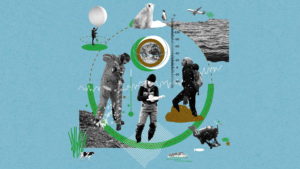The Changing environmental conditions and climatic extremes have highly impacted the Future of traveling and travel industry as it did to several other sectors.
The traveling and tourism industries are also at a critical turning point in an era when climate change presents our planet with a great challenge. The unpredictable weather and the effects of changing climatic circumstances also transform how we view the world.
Several factors are changing the environment, and it is hard to overlook the reality that climate change is one of the most important challenges of our day. Our traveling as we reach new borders increases carbon emissions and environmental stressors, which in turn worsen the situation.
It is a reality that Traveling involves more than just getting somewhere. It covers everything, including travel, lodging, meals, and outings. If we even see the estimates, tourism is responsible for around 8% of global carbon emissions. This footprint includes all of the energy used, materials used, and garbage produced.
Therefore, the future of traveling highly relies on climate and environment.
Transport emissions are not environmentally-friendly and are the highest in terms of greenhouse gas emissions. Per passenger mile, vehicles like cars and airplanes release a considerable amount of CO2. Particularly, air travel has a significant effect on world temperatures. The surprising increase in travel-related emissions creates a dark picture; by 2025, they may account for 12% of all greenhouse gas emissions.
Our trip experiences are changing the environment and are greatly influenced by the accommodations we book and the meals we consume. It is not just a body shift to another place. There is more than ever a need for global solutions. Unfortunately, the energy-intensive methods and food waste common in the hospitality industry only make the situation worse.
Only accommodations account for 21% of CO2 emissions associated with tourism. For a greener future, it is essential that both tourists and the industry accept sustainable practices. Not only accepts but also implements as soon as possible for climate control.
Moreover, Travelers also confront dangers with the Future of traveling as the planet is changing due to climate change.
Climate control acts are a must. Favorite seaside locations are at risk from rising sea levels. Travel patterns are disadvantaged by extreme weather events.
The destiny of our planet and travel are inseparably linked. Despite approaching difficulties, the industry and visitors have the potential to effect change. We can lessen our impact by taking on sustainable lifestyles, from environmentally-friendly travel to eco-friendly places to stay.
All of us are termed to get on the path toward a more environmentally friendly and careful method of transportation.
Statistics Related To The Future of Traveling

- Due to transportation, energy use, and commodities, tourism accounts for about 8% of world carbon emissions.
- Large donors, which excessively influence tiny islands, are high-income nations.
- Carbon emissions are significantly influenced by transportation, particularly aircraft.
- The COVID-19 pandemic cut emissions since fewer people traveled by air, yet it did not stop climate change.
- To cut emissions, people must make practical travel decisions, use alternate forms of transportation, and purchase carbon balances.
- One-fourth of the emissions of greenhouse gases come from the food industry.
- Food waste increases when people travel, which is changing the environment adversely.
- Food waste in the tourism sector is a significant issue and increases emissions, hence impacting the Future of traveling
- Emissions are a result of energy-intensive behaviors like air conditioning and entertainment infrastructure.
- Energy-saving techniques and the utilization of renewable energy sources can help hotels cut emissions.
- Travel patterns are altered by climate change because of things like increasing sea levels and extreme weather.
- Cities along the coast and well-liked vacation spots are at risk from rising sea levels.
- Hurricanes are an example of an extreme weather event that might cause disease outbreaks.
- The geographic spread of vector-borne diseases is impacted by climate change.
- Temperature variations are causing changes in vector habitats and disease transmission patterns.
- Variations in temperature are changing the environment and affect the risk of malaria transmission.
- To address these issues, the Sustainable Development global solutions offer a framework.
- Health risks associated with the climate need to be included in pre-travel counseling.
- Air pollution, heat-related diseases, shifting disease trends, and emergent diseases should all be made aware to travelers.
The Finishing Notes

Travel must be sustainable and responsible.
If environmentally-friendly acts are not getting normal everywhere, it is worrisome that shortly things will be out of control.
No matter how technologically advanced humans become, a hurricane can’t be sent back, rain can’t be lessened, sea level can’t be stored, and whatnot, there is a long list.
Therefore, let us all save the future because it belongs to all of us.
Climate change is an emergency that cannot be ignored because it has serious effects on the Future of traveling and everything.













